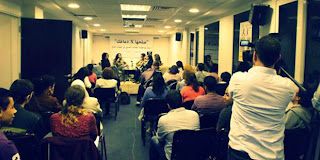 |
| Press Conference for Opt Anti Sexual Harassment |
Op Anti-Sexual Harassment
CAIRO: On Nov.25, four women´s rights organizations gathered to raise awareness of the prevalent gender-based violence that afflicts Egypt. “Op Anti-Sexual Harassment” took place at the headquarters of the Egyptian Initiative for Personal Rights and is part of a larger international campaign to eradicate all forms of gender-based violence called The 16 Days of Activism Against Gender Violence.
Four female activists, representing HarassMap, Nazra for Feminist Studies, Tahrir Bodyguard, and the Egyptian Initiative for Personal Rights, made up the panel of the inauguration of the 16 Days Against Gender Violence campaign. “Op Anti Sexual Harassment” aims to tackle the social acceptability of one of Egypt´s most endemic form of gender-based violence, sexual harassment.
Sexual harassment
Sexual harassment has been normalized by Egyptian society, meaning that it has been accepted by the majority as the norm, thus not worthy of condemning. According to a study carried out by U.N. Women, 99.3 percent of women in Egypt have suffered from sexual harassment. In addition, Reuters has declared Egypt as the worst Arab state for women.
“People call sexual harassment ‘flirtation’ and assault ‘harassment,’” said Amel Fahmy, director of HarrassMap. To end people’s acceptability of sexual harassment, the organizers want to redefine their perception of what constitutes sexual violence. “The language people use to define incidents of sexual violence is too light,” said Dalia Abdel-Hameed, head of the gender program at the Egyptian Initiative for Personal Rights. “We are facing a culture of impunity and victim blaming.”
Since the January 25 Revolution that overthrew former President Hosni Mubarak, women´s rising presence in the public space has been attacked through acts of sexual violence. Tahrir Bodyguard, one of the organizations participating on the campaign, originated in response to the numerous gang rapes of female demonstrators in Tahrir. The organization consists of volunteers, working on the ground, who monitor demonstrations and intervene when a women is being sexually assaulted.
“The government does not face crimes of violence against women,” said Abdel-Hameed. During the massive demonstrations on June 3, 2013, “afraid of ‘defacing’ the reputation of Tahrir,” she said, the authorities refused to coordinate with rights groups to prevent crimes of sexual assault. “This placed a burden on organizations such as, Tahrir Bodyguard, which rescued women from the ‘circle of hell.’”
A myriad of problems plague the state´s efforts to eradicate sexual violence on an institutional level. “Sexual assault is not mentioned on the penal code,” said Amal El-Mohandes, director of Nazra Insitute for Feminist Studies. When a survivor of rape decides to report it, the forensic team requires a virginity test, “which is incredibly burdensome on the survivor,” said El-Mohandes. Other times, “police officers do not give survivors of sexual violence the right to file a lawsuit.” In addition, the penal code’s definition of sexual assault is very ambiguous: rape is not recognized as such when performed with an object or fingers, nor is it recognized if it is assault against men by other men.
“People simply do not understand what rape is,” said Fahmy. The main goal of the campaign is to educate the people about the acts and behaviors that constitute sexual violence. “Every crime must be given the correct term. Rape is rape. Assault is assault,” she said. Without a proper definition of sexual harassment, it cannot be criminalized.
“The terms and definitions that society uses to define sexual violence lead to the ways that society reacts to these crimes,” said Fahmy, director of HarrassMap. In a culture of victim blaming, sexual harassment has nothing to do with the perpetrator, instead the crime is attributed to what the victim was wearing, when and how she was walking; “we live in a culture of impunity,” said Fahmy.
The 16 Days campaign against gender-based violence is a response to the international cry for solidarity in the eradication of all forms of violence against women. The four Egyptian women’s rights organizations are bringing the struggle home by focusing on Egypt’s endemic societal acceptance of sexual violence.
Through workshops, discussions, online campaigning and organizing, self-defense classes, among other activities, the organizations plan to defy society’s perception of sexual violence as well as to empower women.

